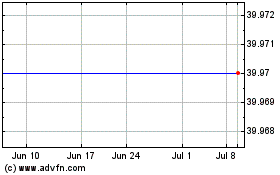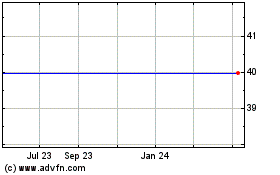Charles Schwab Ending Commissions for Online Trades of Many U.S.-Listed Products -- Update
October 01 2019 - 11:44AM
Dow Jones News
By Alexander Osipovich, Colin Kellaher and Allison Prang
Charles Schwab Corp. said it would eliminate commissions on
online stock trades, the latest and most dramatic move to date in
the e-broker price wars.
The move rattled the online brokerage industry. Like many Wall
Street firms, e-brokers have been squeezed in recent years by
growing expectations among investors that fees for financial
services should be low -- or even nonexistent.
Shares of TD Ameritrade Holding Corp. plummeted 21% in morning
trading, putting the company on track for its biggest percentage
move since 2006. E*Trade Financial Corp. was down 18%, and Schwab
was down 8%.
The three firms' declines wiped out $12 billion in aggregate
market value.
Another rival, Interactive Brokers Group Inc. -- which set the
stage for Schwab's price move when it announced last week that it
would launch a zero-commission stock-trading service -- fell
7%.
Compared with its rivals, Schwab is more reliant on its banking
arm and less dependent on commissions, which make up only about 7%
of total revenue. TD Ameritrade, meanwhile, derives about a quarter
of its revenue from trading.
E-brokers had already been hurting because of falling
stock-trading volumes this year and the U.S. Federal Reserve's
lowering of interest rates, which reduces how much the firms can
make by collecting interest on clients' cash. Following Schwab's
move, analysts warned that other e-brokers would be forced to
follow suit, putting them on track for a potentially ruinous race
to zero.
"There is no way to sugar coat this development," analysts at
Wells Fargo said in a research note. "We were hoping the
challenging macro environment (i.e. declining interest rates) would
prevent the industry from competing on price like this but that is
clearly not what is happening."
The race to zero also shows the disruptive impact of Robinhood
Markets Inc., the Silicon Valley startup that popularized the
concept of zero-commission trading.
Founded in 2012, Robinhood has amassed around six million users,
many of them millennials, with its easy-to-use smartphone app that
lets investors buy and sell stocks without paying a fee.
Robinhood's success has sparked an array of imitators offering free
stock trades, including Webull, M1 Finance, TradeZero and
Dough.
Even JPMorgan Chase & Co. got in on the game last year by
unveiling its You Invest product, which offers customers at least
100 free stock or ETF trades per year and is aimed at younger,
first-time investors.
To make money, zero-commission brokerages like Robinhood rely
heavily on a controversial practice called "payment for order
flow," in which they route customers' orders to buy or sell shares
to electronic trading firms like Citadel Securities and Virtu
Financial Inc., in return for cash payments.
Schwab's change applies to commissions for stocks,
exchange-traded funds and options listed on U.S. or Canadian
exchanges. The San Francisco financial-services company currently
charges a commission of $4.95 for online U.S. stock, ETF and
options trades. Charles Schwab said clients trading options will
continue to pay 65 cents per contract.
Fees for trading options have been particularly resilient, even
as other prices fall, and online brokers have worked to boost the
amount of options trading their clients do.
Charles Schwab said its move, which is effective Oct. 7, is
aimed at making online investing more affordable. It noted that new
firms entering the market often use zero or low commissions as a
lever.
"We don't want to fall into the trap that a myriad of other
firms in a variety of industries have fallen into and wait too long
to respond to new entrants," Chief Financial Officer Peter Crawford
said in a note on the company's website. "It has seemed inevitable
that commissions would head towards zero, so why wait?"
Keeping services less costly for customers has been a focus of
Schwab's. The company has also tried to make financial planning
cheaper for customers.
Charles Schwab said the pricing reduction is equivalent to about
$90 million to $100 million in quarterly revenue, which roughly
translates to 3% to 4% of total net revenue. However, the firm said
its commissions per revenue trade have been falling for several
years, "so the potential revenue impact in coming quarters could
very well be smaller."
TD Ameritrade said it was reviewing the Schwab announcement. "We
will remain competitive," a spokeswoman for the Omaha, Neb.-based
brokerage said. E*Trade and Robinhood didn't immediately respond to
requests for comment.
"The more the merrier," Interactive Brokers Group Inc. Chairman
and Chief Executive Officer Thomas Peterffy said in an email.
Write to Alexander Osipovich at
alexander.osipovich@dowjones.com, Colin Kellaher at
colin.kellaher@wsj.com and Allison Prang at
allison.prang@wsj.com
(END) Dow Jones Newswires
October 01, 2019 11:29 ET (15:29 GMT)
Copyright (c) 2019 Dow Jones & Company, Inc.
TD Ameritrade (NASDAQ:AMTD)
Historical Stock Chart
From Mar 2024 to Apr 2024

TD Ameritrade (NASDAQ:AMTD)
Historical Stock Chart
From Apr 2023 to Apr 2024
